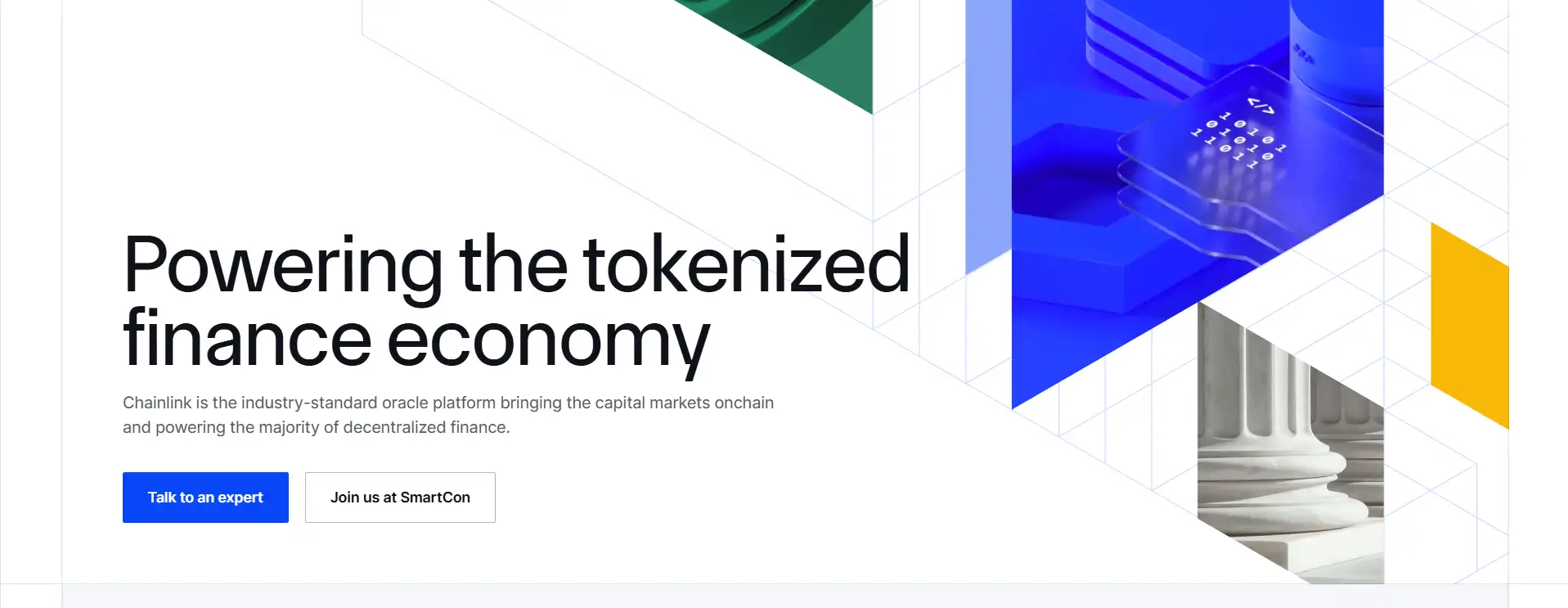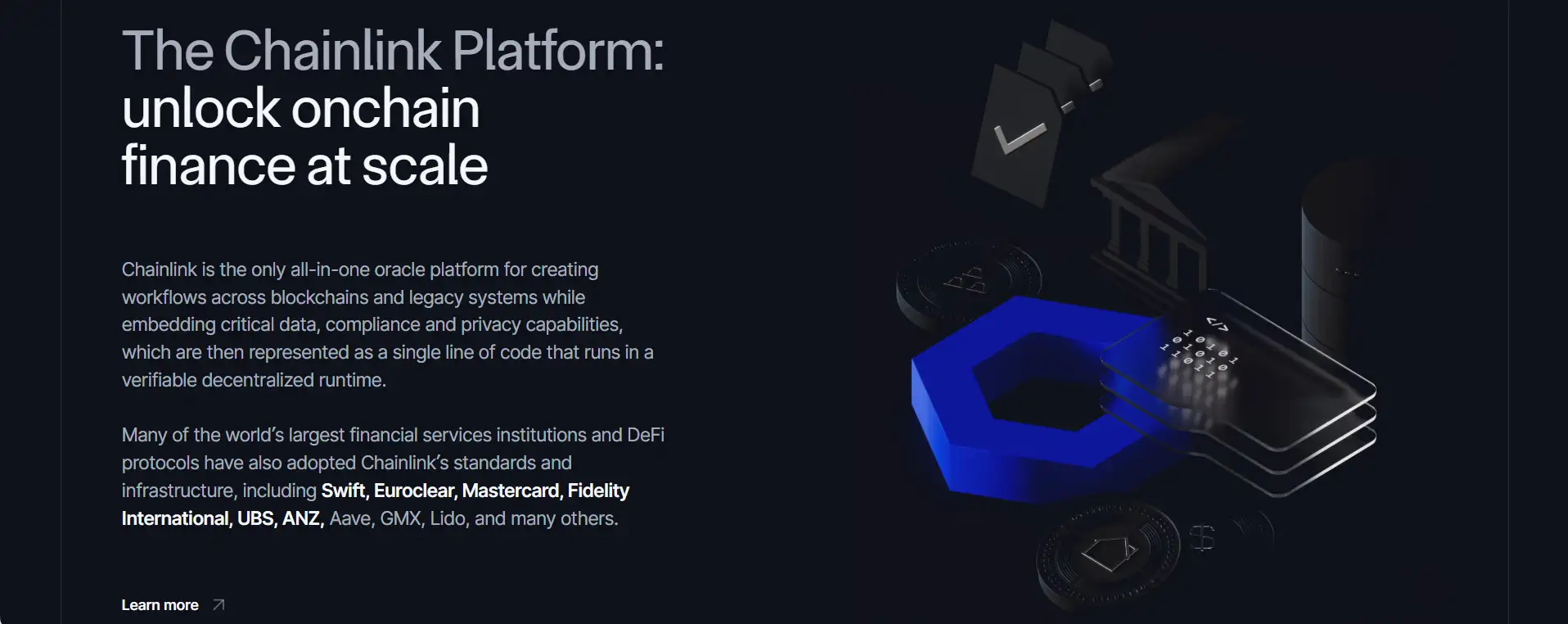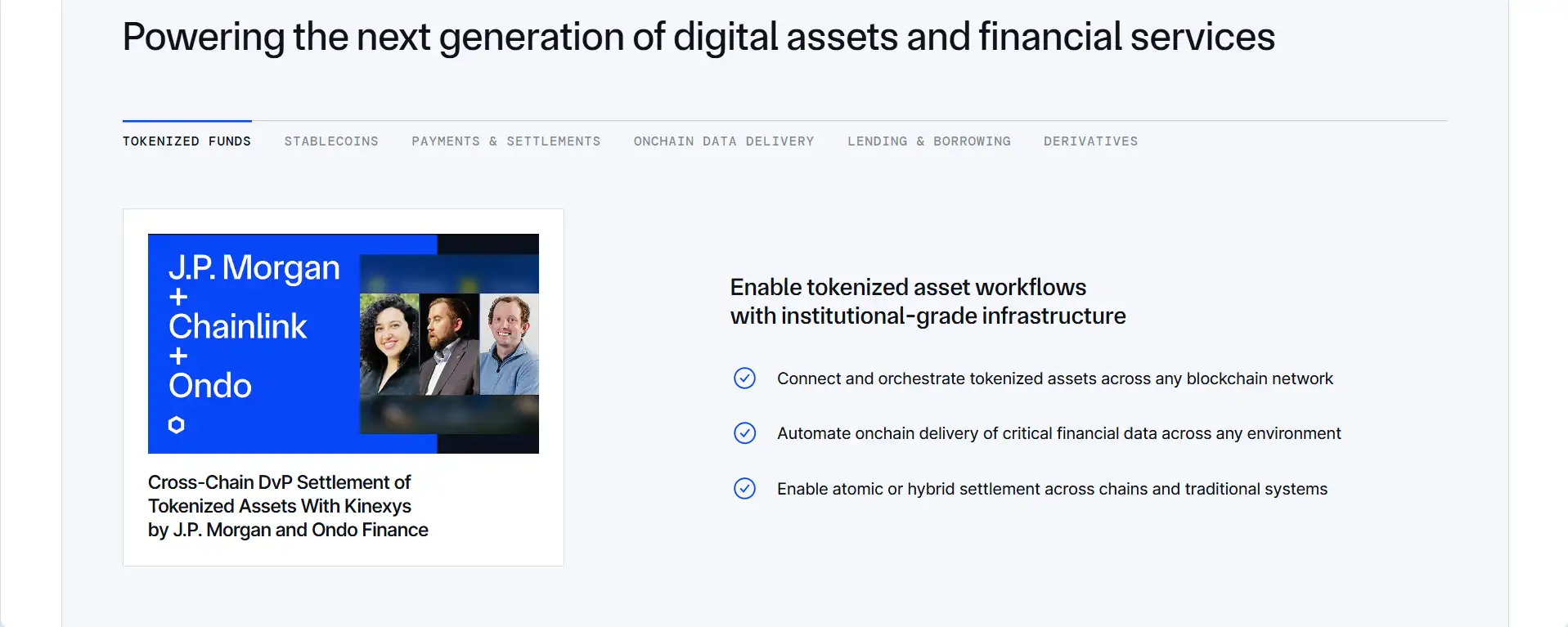About Chainlink
Chainlink is the industry-leading decentralized oracle network that powers secure and reliable data exchange between smart contracts and real-world systems. As the backbone of the tokenized finance economy, Chainlink provides the critical infrastructure needed to bring external data, cross-chain communication, and offchain computation onto any blockchain. Trusted by top-tier institutions and DeFi protocols, Chainlink enables the creation of advanced onchain applications that are data-driven, verifiable, and scalable.
From price feeds and verifiable randomness to proof of reserves and cross-chain interoperability, Chainlink offers a modular suite of services that abstract away complexity for developers and enterprises. Its decentralized oracle networks have powered over $25 trillion in transaction value and are integrated into applications across sectors like lending, stablecoins, insurance, derivatives, gaming, and more. With partners like Swift, Mastercard, Euroclear, and J.P. Morgan, Chainlink is leading the global shift to verifiable, onchain financial systems.
Chainlink was designed to solve one of blockchain’s most fundamental limitations — the inability of smart contracts to access data from the outside world. While blockchains are secure and deterministic by design, they are inherently disconnected from external systems. Chainlink bridges this gap through a network of decentralized oracles that deliver high-quality, tamper-proof data to onchain environments. This unlocks use cases that rely on real-world inputs, such as market prices, weather data, identity verification, and more.
The platform operates through a vast and evolving ecosystem of node operators, developers, and institutions. These oracles independently source data from multiple APIs and deliver it to smart contracts through decentralized oracle networks (DONs). To ensure accuracy, responses are aggregated and cryptographically verified, making the data feed both resilient and tamper-proof. Chainlink services are blockchain-agnostic, enabling interoperability across Ethereum, Polygon, Solana, Arbitrum, Optimism, and many other networks.
Core services offered by Chainlink include:
- Price Feeds: Secure, real-time financial market data used in DeFi apps like Aave and Compound.
- Proof of Reserve: Verifies that assets like stablecoins or wrapped tokens are fully collateralized.
- CCIP (Cross-Chain Interoperability Protocol): Enables value and message transfers across multiple chains.
- Data Streams: Low-latency push-based data for high-speed trading applications.
- Chainlink Functions: Serverless smart contract connectivity to external APIs and systems.
- Verifiable Random Function (VRF): Provides cryptographic randomness for gaming and NFTs.
One of Chainlink’s most powerful differentiators is its real-world adoption by enterprises and institutions. From enabling Mastercard’s onchain payments to integrating with Swift’s cross-border messaging infrastructure, Chainlink is at the forefront of bringing traditional finance (TradFi) onchain. Global financial players like UBS, Euroclear, and ANZ have collaborated with Chainlink to explore secure, tokenized settlement solutions, particularly for derivatives and cross-border assets.
Chainlink’s competitors include Band Protocol, and Witnet. However, none match its scale, ecosystem breadth, or institutional traction. With over 1,000 decentralized oracle networks, Chainlink supports an unparalleled number of use cases and continues to evolve through community-driven development and partnerships with global leaders.
Chainlink provides numerous benefits and features that make it the global standard for onchain connectivity:
- Enterprise Adoption: Trusted by major institutions like Swift, Mastercard, and Euroclear to bridge financial systems to blockchain.
- Cross-Chain Interoperability: Through CCIP, Chainlink enables secure value and data transfer across dozens of blockchains.
- Modular Architecture: Developers can integrate only what they need — from data feeds to computation and randomness — reducing complexity.
- Security & Uptime: Chainlink nodes have a multi-year track record of reliability and are operated by top-tier infrastructure providers.
- Decentralization at Scale: Each service runs through independent oracle nodes, ensuring Sybil resistance and high availability.
- Tokenized Finance Infrastructure: Enables stablecoins, tokenized assets, lending, derivatives, and more through verifiable offchain data.
Chainlink is designed to be accessible for developers, data providers, and enterprises looking to harness the power of real-world data in smart contracts:
- Visit the Platform: Go to chain.link and explore the latest products and integrations.
- Developers Start Building: Access the Chainlink documentation and explore APIs, node configuration, and tutorials.
- Get Certified: Join the Build Program or enroll in a Chainlink Bootcamp to deepen your expertise.
- Run a Node: Become a Chainlink node operator and monetize your infrastructure by delivering real-time data onchain.
- Join the Community: Participate in hackathons, discussions, and governance via the official X account.
- Integrate Chainlink Services: Whether you're building a DeFi protocol, game, or enterprise application, Chainlink offers plug-and-play oracle modules to suit your use case.
Chainlink FAQ
Chainlink provides secure, scalable infrastructure for tokenized asset workflows, enabling institutions to bridge real-world systems with smart contracts. Through integrations with Mastercard, Swift, UBS, and Euroclear, Chainlink supports use cases like settlement automation, stablecoin issuance, and cross-border payments. By offering data compliance, privacy layers, and cross-chain capabilities, it enables banks and asset managers to interact with DeFi infrastructure while meeting regulatory and operational standards.
CCIP is Chainlink’s protocol for secure, decentralized cross-chain communication. It allows smart contracts and financial applications to transfer data, messages, and tokens across blockchain networks, creating seamless interoperability. With CCIP, developers can build multi-chain dApps and enable atomic or hybrid settlements involving both onchain and traditional systems. This functionality is critical for scaling tokenized finance and is trusted by institutions like J.P. Morgan for real-world deployments.
Using a single oracle source creates a central point of failure and exposes smart contracts to manipulated or faulty data. Chainlink solves this with decentralized oracle networks (DONs), which aggregate responses from multiple independent node operators. This multi-source architecture ensures data accuracy, tamper resistance, and fault tolerance. For example, Chainlink Price Feeds use multiple nodes and sources to ensure secure and fair execution across DeFi protocols like Aave and Compound.
Chainlink works with professional node operators, such as Deutsche Telekom MMS, who follow best-in-class security practices and maintain 24/7 monitoring. Oracles are continuously audited and rated based on uptime, latency, and accuracy, which are publicly verifiable through third-party platforms like market.link. This decentralized structure, combined with redundancy and failover mechanisms, ensures that Chainlink continues to deliver reliable data—even during extreme market volatility or network congestion.
Yes. Chainlink abstracts blockchain complexity by providing plug-and-play oracle solutions that enterprises can integrate using standard APIs and existing workflows. Services like Proof of Reserve, CCIP, and Data Streams come with pre-built SDKs, documentation, and enterprise support. This allows traditional companies to participate in onchain finance without having to build or maintain blockchain infrastructure themselves.
You Might Also Like












